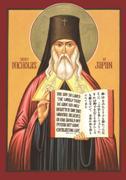St. Nicholas of Japan
ST. NICHOLAS OF JAPAN

Objectives:
- Students should be able to name Nicholas as the evangelizer of Japan.
- Students should know a bit about the Japanese culture and language.
Possible Lesson Plan:
- Open with prayer.
- Tell the story of St. Nicholas of Japan:
John Kasatkin was born almost 200 years ago in the land of Russia. John’s mother died when he was only five years old. John and his father were very poor, but John was smart and studied hard in school. In school, John heard about many lands far away – China and Japan. He wanted to tell the people of these lands about Jesus.
Then one day a note was put up on the bulletin at John’s school. The Russians in Japan were asking for a priest. John had finished his studies to be a priest. He first became a monk, and was given the name, Nicholas. Then he was ordained a priest. He was ready to go to Japan.
But, the samurai who ruled Japan hated all foreigners! They had their Shinto religion and did not want anyone talking about Jesus. Nicholas spent several years waiting, but while he waited he learned the language and customs of the Japanese people. A few came to him in secret and learned about the Christian faith. Many of these early believers were thrown in prison, just as the Romans had the earlier Christians. But, Nicholas never gave up.
Finally, the rulers allowed the Christian faith. Nicholas could print Bibles in the Japanese language and open churches and teach priests. Foreigners were still not allowed in most parts of Japan, but these new Japanese priests could tell the people all over the country about Jesus. Soon there were hundreds of Christians all over Japan. Nicholas opened schools, both for boys and girls. This was new for the Japanese; girls usually did not go to school.
Nicholas became the first bishop of Japan. He built the beautiful Holy Resurrection Cathedral in Tokyo. He traveled all over Japan visiting Churches. He loved the Japanese people, so much so, that he stayed in Japan during the Russian-Japanese war, even though many of the Japanese rulers thought he was a spy! Nicholas died at the age of 76 in his beloved Japan and is called “Equal to the Apostles”.
Add St. Nicholas of Japan to your timeline.
- True/False Questions:
True False
Nicholas was born in Russia. Nicholas was born in Japan.
Nicholas learned the Japanese language. The Japanese learned the Russian language.
Nicholas is called “Equal to the Apostles”. Nicholas was a Russian spy.
- Talk a bit about Japanese culture: This time, act it out. Have the children take off their shoes and line them up at the door. Bring some small blankets they can lie down on and roll up along the walls of the classroom. Teach a few words of Japanese, bowing a bit when saying “Ko-nee-chee-wah”, or “Hello”. Have a cup of tea, sitting on the floor, bowing to each other. Talk about the importance of learning other people’s ways, which shows you respect their customs. This is what Nicholas did in Japan; he learned the Japanese language, good Japanese manners, ate Japanese food, and lived in a Japanese home. He was loved for this by the Japanese people.
- Make a Japanese pearl necklace: Japan is known for its pearl divers. Do you know where pearls come from? Use a piece of fishing line for the necklace. Buy a bag of mixed size fake pearls. There is no need to put enough pearls on the line to go all the way around the neck. Use 10-12 pearls per student and make a beautiful necklace arranging them by size. In the end, tie the ends to fit exactly around the neck but able to get over the head; alternatively, you can purchase necklace fasteners and tie one on each end. The knots must be cemented with household cement or something similar; fishing line will otherwise untie itself! The boys can make these for their mothers.
- Close with prayer: Lord, help me to love other people enough to learn what they like and do things their way.